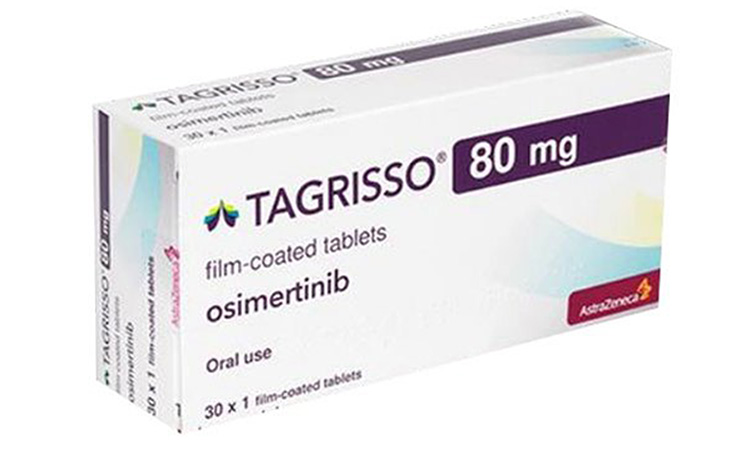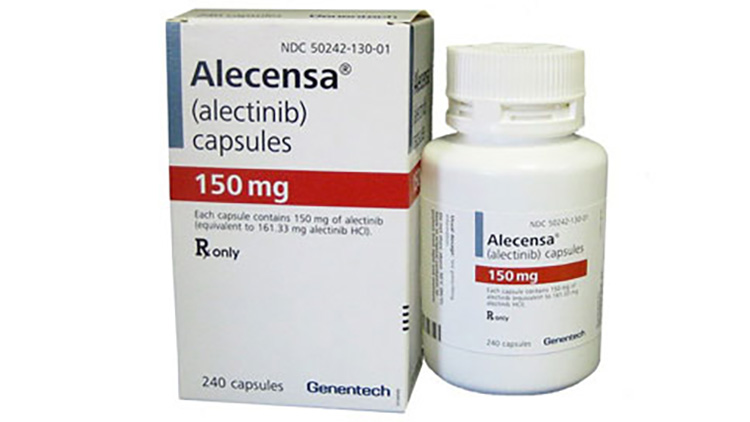Tagrisso (osimertinib) vs Alecensa (alectinib)
Tagrisso (osimertinib) vs Alecensa (alectinib)
Tagrisso (osimertinib) and Alecensa (alectinib) are both oral medications used in the treatment of non-small cell lung cancer (NSCLC), but they target different genetic mutations. Tagrisso is specifically designed to inhibit epidermal growth factor receptor (EGFR) mutations, including T790M, and is often used in patients with advanced NSCLC who have progressed on or after EGFR tyrosine kinase inhibitor therapy. In contrast, Alecensa targets anaplastic lymphoma kinase (ALK) positive NSCLC and is used as a first-line treatment in patients with this specific genetic profile. Patients should consult with their oncologist to determine which medication is appropriate based on their individual genetic mutation status and overall health condition.
Difference between Tagrisso and Alecensa
| Metric | Tagrisso (osimertinib) | Alecensa (alectinib) |
|---|---|---|
| Generic name | Osimertinib | Alectinib |
| Indications | Non-small cell lung cancer (NSCLC) with specific EGFR mutations | Non-small cell lung cancer (NSCLC) with ALK-positive |
| Mechanism of action | EGFR tyrosine kinase inhibitor | ALK tyrosine kinase inhibitor |
| Brand names | Tagrisso | Alecensa |
| Administrative route | Oral | Oral |
| Side effects | Diarrhea, rash, dry skin, nail toxicity, stomatitis | Fatigue, constipation, edema, myalgia, anemia |
| Contraindications | Hypersensitivity to osimertinib or excipients | Hypersensitivity to alectinib or excipients |
| Drug class | Antineoplastic agent | Antineoplastic agent |
| Manufacturer | AstraZeneca | Genentech (a member of the Roche Group) |
Efficacy
Overview of Tagrisso (Osimertinib) Efficacy in Lung Cancer
Tagrisso (osimertinib) is a third-generation, irreversible epidermal growth factor receptor (EGFR) tyrosine kinase inhibitor that is specifically designed to target EGFR mutations in non-small cell lung cancer (NSCLC). Its efficacy has been demonstrated in patients with metastatic EGFR T790M mutation-positive NSCLC who have progressed on or after EGFR tyrosine kinase inhibitor therapy. Clinical trials have shown that osimertinib significantly improves progression-free survival compared to standard chemotherapy in this patient population. Moreover, osimertinib has been found to have central nervous system (CNS) activity, which is particularly important as brain metastases are common in NSCLC.
Tagrisso's Role in First-Line Treatment
The efficacy of Tagrisso as a first-line treatment has also been investigated. The FLAURA trial, a phase III study, demonstrated that osimertinib significantly improved progression-free survival compared to standard EGFR tyrosine kinase inhibitors (erlotinib or gefitinib) in patients with previously untreated EGFR-mutated NSCLC. The trial also indicated a favorable safety profile for osimertinib, with fewer reports of severe adverse events compared to the control group. Based on these results, osimertinib has been approved for the first-line treatment of patients with metastatic NSCLC whose tumors have specific types of EGFR mutations.
Alecensa (Alectinib) Efficacy in Lung Cancer
Alecensa (alectinib) is an oral medication used as a first-line treatment for ALK-positive metastatic NSCLC. Alectinib is a highly selective ALK inhibitor that has shown substantial efficacy in this subset of lung cancer patients. The ALEX trial, a phase III clinical study, compared alectinib to crizotinib, another ALK inhibitor, and demonstrated that alectinib significantly prolonged progression-free survival. It also reduced the risk of CNS progression, which is a common issue in ALK-positive NSCLC patients, suggesting that alectinib has a strong CNS penetration.
Comparative Efficacy and Considerations
While both Tagrisso and Alecensa have shown high efficacy in treating specific mutations in NSCLC, their applications are mutation-specific. Osimertinib is used for EGFR-mutated NSCLC, whereas alectinib targets ALK-positive cases. Both drugs have made significant advances in the treatment of lung cancer, offering targeted therapy options that can lead to better outcomes and improved quality of life for patients. The choice of therapy is dependent on the molecular profile of the tumor, and therefore, molecular testing is essential before initiating treatment with either medication.
Regulatory Agency Approvals
Tagrisso
-
European Medical Agency (EMA), European Union

-
Food and Drug Administration (FDA), USA

-
Health Canada

-
Therapeutic Goods Administration (TGA), Australia

-
Medsafe (NZ)

Alecensa
-
European Medical Agency (EMA), European Union

-
Food and Drug Administration (FDA), USA

-
Health Canada

-
Pharmaceuticals and Medical Devices Agency (PMDA), Japan

-
Therapeutic Goods Administration (TGA), Australia

-
Medsafe (NZ)

Access Tagrisso or Alecensa today
If Tagrisso or Alecensa are not approved or available in your country (e.g. due to supply issues), you can access them via Everyone.org.
How it works

Make an enquiry
Choose the medicine you want to buy, answer a couple of questions, and upload your prescription to speed things up. We’ll get back to you within 24 hours.


Make an enquiry
Choose the medicine you want to buy, answer a couple of questions, and upload your prescription to speed things up. We’ll get back to you within 24 hours.


Breeze through the paperwork
We'll guide you through the required documents for importing unapproved medicine, ensuring you have all the necessary information.


Get a personalized quote
We’ll prepare a quote for you, including medicine costs and any shipping, administrative, or import fees that may apply.


Receive your medicine
Accept the quote and we’ll handle the rest - sourcing and safely delivering your medicine.

Some text on this page has been automatically generated. Speak to your physician before you start a new treatment or medication.
Let's talk
If you have any questions, call us or send us a message through WhatsApp or email:
Contact us




